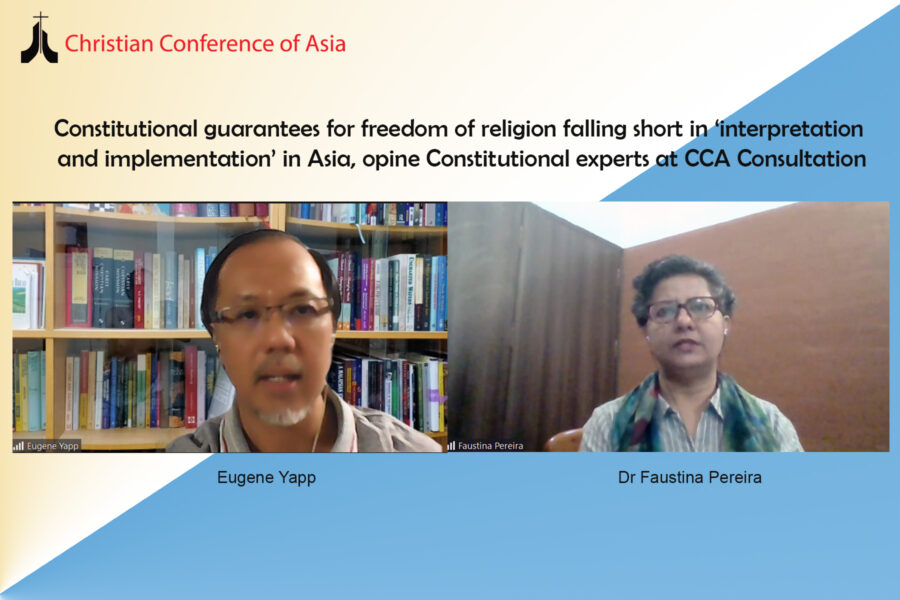Constitutional guarantees for freedom of religion falling short in ‘interpretation and implementation’ in Asia, opine Constitutional experts at CCA Consultation

“Although a majority of Asian countries have strong constitutional provisions and guarantees to secure their citizens’ freedom of religion and belief (FoRB), there are severe shortcomings in interpretation and implementation, or in upholding such principles in practice,” observed two legal experts on the third day of the CCA’s Asia Regional Consultation on ‘Freedom of Religion, Rights of Religious Minorities, and Constitutional Guarantees in Asia’.
The focus of the third day of the Asia Regional Consultation was on constitutional guarantees in Southeast and South Asia.
Eugene Yapp, Senior Fellow, Religious Freedom Institute’s Southeast Asia Team, presented the Southeast Asian perspective on constitutional guarantees for freedom of religion.
“In order for FoRB to be secure, enhanced, and applicable to all human beings, we must comply with constitutional provisions and be consistent with international declarations. If constitutional guarantees are to be meaningful, there is a need for more contextualized or localized approaches based on ground realities—such as cultural particularities and contingencies of a local nature,” said Mr Yapp, who was the Secretary-General of the Evangelical Alliance of Malaysia.
Mr Yapp also elaborated upon the role of the Church and its missional calling, stating that the Church must seek concrete expression for the flourishing of diversity of cultures in social engagement and creative dialogue for the wellbeing of everyone, i.e., the common good.
“We become the expression of God’s grace by bringing development and wellbeing to everyone. When people see the Church doing this, FoRB is cherished; and when FoRB is cherished, common religious, spiritual, and moral values will undergird inclusiveness for peaceful coexistence with a healthy respect for diversity. This allows for public institutions and agencies to be recalibrated for efficient deliveries and adequate protection—FoRB is then no longer viewed with suspicion, and constitutional guarantees become more meaningful,” Mr Yapp pointed out.
Dr Faustina Pereira, an Advocate at the Supreme Court of Bangladesh delivered the South Asian perspective on constitutional guarantees for freedom of religion.
With examples from the Constitution of Bangladesh, Dr Pereira explained the presence and intersectionalities of hidden spaces within constitutional provisions for action: “In our founding documents, what some may see as limiting caveats, we see as the opportunity in these articulated and unarticulated spaces within which we can find greater protections and flourish creatively…We can find answers within our constitutions, including negotiated unspoken spaces. This is where we can enact strategic advocacy.”
Mr Yapp and Dr Pereira further shared sets of steps and recommendations for advocacy.
Dr Pereira recommended actions such as appropriately situating religions freedom within the complex web of competing and complementing freedoms, identifying those freedoms that are most directly under threat (such as freedom expression, thought, conscience) and exploring critical alliances across freedom movements (such as those combating the shrinking space for civil society, suppression of dissent, mal-development, etc.), exercising introspection within our own communities, recognizing sub-minorities within minority communities (i.e., those voices that are being left out or left behind), and pairing national platforms and tools (affirmative action, quota representation, etc.) with global frameworks (such as the UN’s SDGs), among others.
Mr Yapp proposed the idea of dialogical engagement to enhance relationships, build trust, and identify common opportunities for solution-making. Such an approach did not insist on one’s own rights but rather identified corresponding duties for a balanced, middle-ground position.
The sharing by participants looked at ‘Freedom of Religion: Rights and Responsibilities’, with reflections on the common good and its alignment with the ‘Great Commission’, maligning trends of forceful and aggressive proselytisation, and best practices for interfaith fellowship and understanding at the grassroots.
About 50 participants are attending the Consultation being held from 5 to 8 October 2021.
The final day of the Consultation on Friday 8 October will include a presentation on ‘Minority Rights: Understanding Asia’s Majority-Minority Contexts’ by the UN Special Rapporteur for Minority Rights, Dr Fernand de Varennes, and a panel discussion on ‘A Shared Vision: Allies for Peace and the Common Good’.










